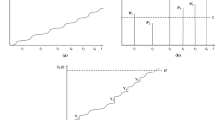Abstract
In the absence of failure data, to use the inaccurate empirical data given by experts to evaluate the reliability of the system, the inaccurate empirical data are regarded as uncertain variables, and the parameters in uncertainty distribution function are also uncertain variables. This paper studies an extreme shock model with dependent competitive failure, both internal natural degradation and external shock can cause system failure, the external shock will cause a sudden increase in the amount of degradation. The degradation process is a linear uncertain process, and the external shock is described by an uncertain renewal reward process. The reliability and the mean time to failure of the system are calculated by employing uncertainty theory. Using micro-electro-mechanical systems (MEMS) as an example, the sensitivity of the system reliability is simulated, and the reliability of the system under uncertain parameters and constants is compared, as well as the reliability of the system under the dependent competitive failure model and the independent competitive failure model.



Similar content being viewed by others
Explore related subjects
Discover the latest articles and news from researchers in related subjects, suggested using machine learning.References
Chien Y, Sheu S, Zhang Z, Love E (2006) An extended optimal replacement model of systems subject to shocks. Eur J Oper Res 175(1):399–412
Ding S, Zeng X (2018) Uncertain random assignment problem. Appl Math Model 56:96–104
Gao H, Cui L, Dong Q (2020) Reliability modeling for a two-phase degradation system with a change point based on a Wiener process. Reliab Eng Syst Saf. https://doi.org/10.1016/j.ress.2019.106601
Hao S, Yang J, Ma X, Zhao Y (2017) Reliability modeling for mutually dependent competing failure processes due to degradation and random shocks. Appl Math Model 51:232–249
Jiang L, Feng Q, Coit D (2012) Reliability and maintenance modeling for dependent competing failure processes with shifting failure thresholds. IEEE Trans Reliab 61(4):932–948
Li W, Pham H (2005) Reliability modeling of multi-state degraded systems with multi-competing failures and random shocks. IEEE Trans Reliab 54(2):297–303
Liu B (2007) Uncertainty Theory, 2nd edn. Springer-Verlag, Berlin
Liu B (2009) Theory and Practice of Uncertain Programming, 2nd edn. Springer-Verlag, Berlin
Liu B (2010a) Uncertain risk analysis and uncertain reliability analysis. J Uncertain Syst 4(3):163–170
Liu B (2010b) Uncertainty Theory: a branch of mathematics for modeling human uncertainty. Springer-Verlag, Berlin
Liu B (2012) Why is there a need for uncertainty theory. J Uncertain Syst 6(1):3–10
Liu S (2019) Leave-p-out cross validation test for uncertain Verhulst-Pearl model with imprecise observations. IEEE Access 7:131705–131709
Liu Y, Ha M (2010) Expected value of function of uncertain variables. J Uncertain Syst 4(3):181–186
Liu Z, Yang Y (2020) Least absolute deviations estimation for uncertain regression with imprecise observations. Fuzzy Optim Decis Making 19:33–52
Liu B, Zhang Z, Wen Y (2019) Reliability analysis for devices subject to competing failure processes based on chance theory. Appl Math Model 75:398–413
Liu Z, Hu L, Liu S, Wang Y (2020) Reliability analysis of general systems with bi-uncertain variables. Soft Comput 24:6975–6986
Rafiee K, Feng Q, Coit D (2014) Reliability modeling for dependent competing failure processes with changing degradation rate. IIE Trans 46(5):483–496
Rafiee K, Feng Q, Coit D (2017) Reliability assessment of competing risks with generalized mixed shock models. Reliab Eng Syst Saf 159:1–11
Sheng Y, Ke H (2020) Reliability evaluation of k-out-of-n systems with multiple states. Reliab Eng Syst Saf. https://doi.org/10.1016/j.ress.2019.106696
Tang H (2020) Uncertain vector autoregressive model with imprecise observations. Soft Comput. https://doi.org/10.1007/s00500-020-04991-9
Wang Y, Pham H (2012) Modeling the dependent competing risks with multiple degradation processes and random shock using time-varying copulas. IEEE Trans Reliab 6(1):13–22
Wang J, Bai G, Li Z, Zuo M (2020a) A general discrete degradation model with fatal shocks and age-and-state-dependent nonfatal shocks. Reliab Eng Syst Saf. https://doi.org/10.1016/j.ress.2019.106648
Wang J, Li Z, Bai G, Zuo M (2020b) An improved model for dependent competing risks considering continuous degradation and random shocks. Reliab Eng Syst Saf. https://doi.org/10.1016/j.ress.2019.106641
Weidea J, Pandeyb M, Noortwijk J (2010) Discounted cost model for condition-based maintenance optimization. Reliab Eng Syst Saf 95(3):236–246
Yang X, Liu B (2019) Uncertain time series analysis with imprecise observations. Fuzzy Optim Decis Making 18:263–278
Yang X, Ni Y, Zhang Y (2017) Stability in inverse distribution for uncertain differential equations. J Intell Fuzzy Syst 32(3):2051–2059
Yao K (2015) Uncertain differential equation with jumps. Soft Comput 19(7):2063–2069
Yao K, Liu B (2018) Uncertain regression analysis: An approach for imprecise observations. Soft Comput 22:5579–5582
Yao K, Zhou J (2016) Uncertain random renewal reward process with application to block replacement policy. IEEE Trans Fuzzy Syst 24(6):1637–1647
Zhang Q, Kang R, Wen M (2018) Belief reliability for uncertain random systems. IEEE Trans Fuzzy Syst 26(6):3605–3607
Acknowledgements
This research is supported by the National Natural Science of China under Grants No. 71601101, Scientific and Technological Innovation Programs of Higher Education Institutions in Shanxi (2020L0463, 2019L0738).
Author information
Authors and Affiliations
Corresponding author
Additional information
Publisher's Note
Springer Nature remains neutral with regard to jurisdictional claims in published maps and institutional affiliations.
Rights and permissions
About this article
Cite this article
Shi, H., Wei, C., Zhang, Z. et al. Reliability analysis of dependent competitive failure model with uncertain parameters. Soft Comput 26, 33–43 (2022). https://doi.org/10.1007/s00500-021-06398-6
Accepted:
Published:
Issue Date:
DOI: https://doi.org/10.1007/s00500-021-06398-6




